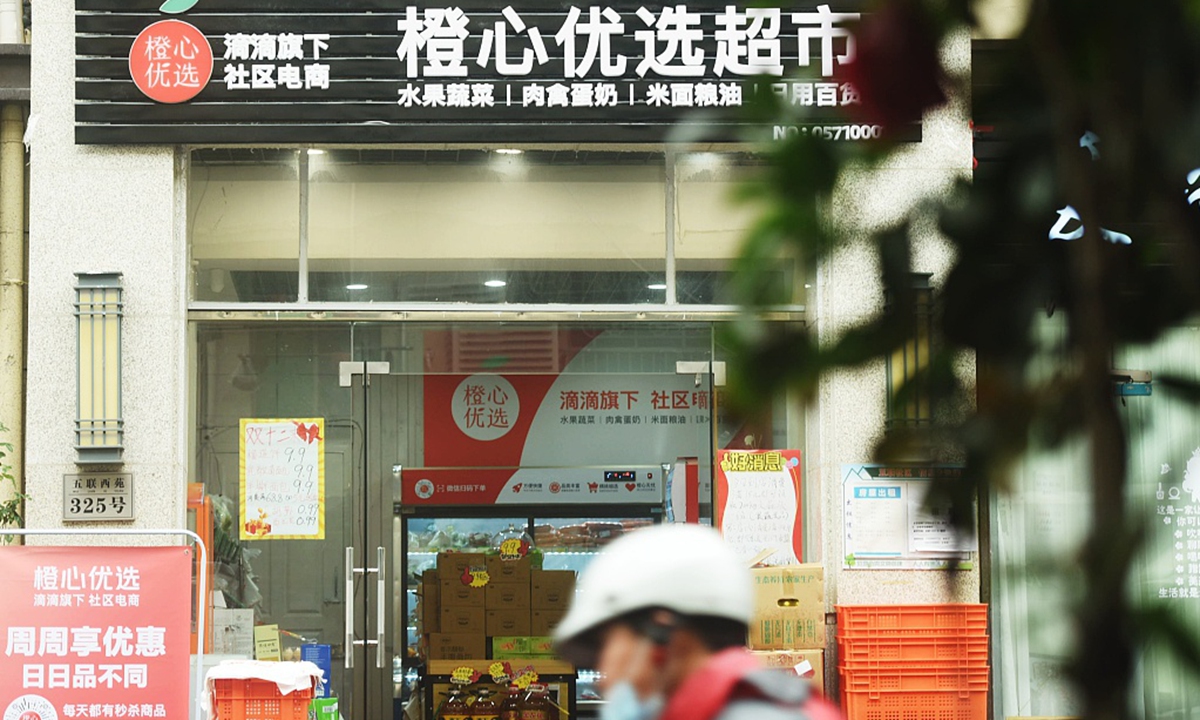
Photo: CFP
China's State Administration for Market Regulation has fined five community group buying platforms on Wednesday due to their unfair price competition practices, a move showing the country's strengthening supervision on emerging online businesses.
The top market regulator has issued the "maximum fine" of 6.5 million yuan ($1.01 million) in total to the five companies, including Chengxin Youxuan, Duo Duo Maicai under Pinduoduo, Meituan Youxuan under Meituan, Nicetuan under Beijing Shihuituan Tech Co, and Wuhan-based Shixianghui.
According to the explanation by the China's State Administration for Market Regulation on Wednesday, these companies used unfair means to squeeze the offline community market. By utilizing the online platforms' advantages of a large amount of capital and big flow of data, theses platforms grasp the market by giving consumers prices lower than costs, resulting in adverse impact to local merchants and convenience stores in communities, according to the regulator.
By competing for market share with unreasonably low prices, giving large amounts of and frequent subsidy vouchers to consumers, these platforms can increase their business volume to explode, creating large pressure for farmers' markets, offline trade markets and other small merchants.
In addition, there is a tendency for big online platforms to "spend huge amount of money in order to acquire market share, monopolize, then raise the prices." Such unfair competition may hurt the legal rights and interests of consumers, according to the regulator.
The improper price practices by these platforms also disrupt market order, because it is normal to see huge subsidy and price dumping on the platforms. Some platforms draw consumers by manipulating prices.
"If adding up the costs of operation, storage and logistics, the real sales revenue are way smaller than the costs of the goods. [Hence,] they disturb the normal order of production and operation, harm the legal rights of other operators," said the State Administration for Market Regulation.
Due to the huge impact on market competition, negative social influence and flagrant violation of laws, the top market regulator made the decision to give the maximum fine to the five companies according to law.
Chen Danzhou, an anti-monopoly deputy professor with the University of International Business and Economics told the Global Times that price dumping can give the companies a larger share in the market, but will leave consumers vulnerable when the company reaches monopoly.
"The monopoly in a market such as fresh produce market, is especially harmful, because it is highly relevant to people's livelihood," Chen said, "that is why the punishment is tougher than expected."
According to Chen, the practices used by the five companies, including low price dumping and unfair competition through false pricing and discounts are strictly prohibited in China's anti-monopoly laws, but the companies are punished according to the price laws instead monopoly because they have yet to reach the market size of monopoly.
"This also shows the regulator's determination to suppress the monopoly in the market at an early stage," Chen said.
Chengxin Youxuan, which was fined 1.5 million yuan, said on Wednesday it takes the fine seriously and will rectify all the relevant problems, strictly abide by laws and regulations and make every effort to protect the legitimate rights and interests of consumers.
China has been strengthening supervision over its big online tech firms, which contribute a great amount to the country's booming emerging economy, citing mounting concerns that some have built market power that disturb competition, misused consumer data and harm consumer rights.
Starting from mid-December last year, the country's top market regulator started investigation on the five platforms, expecting tough penalties on them would deter other online companies.

